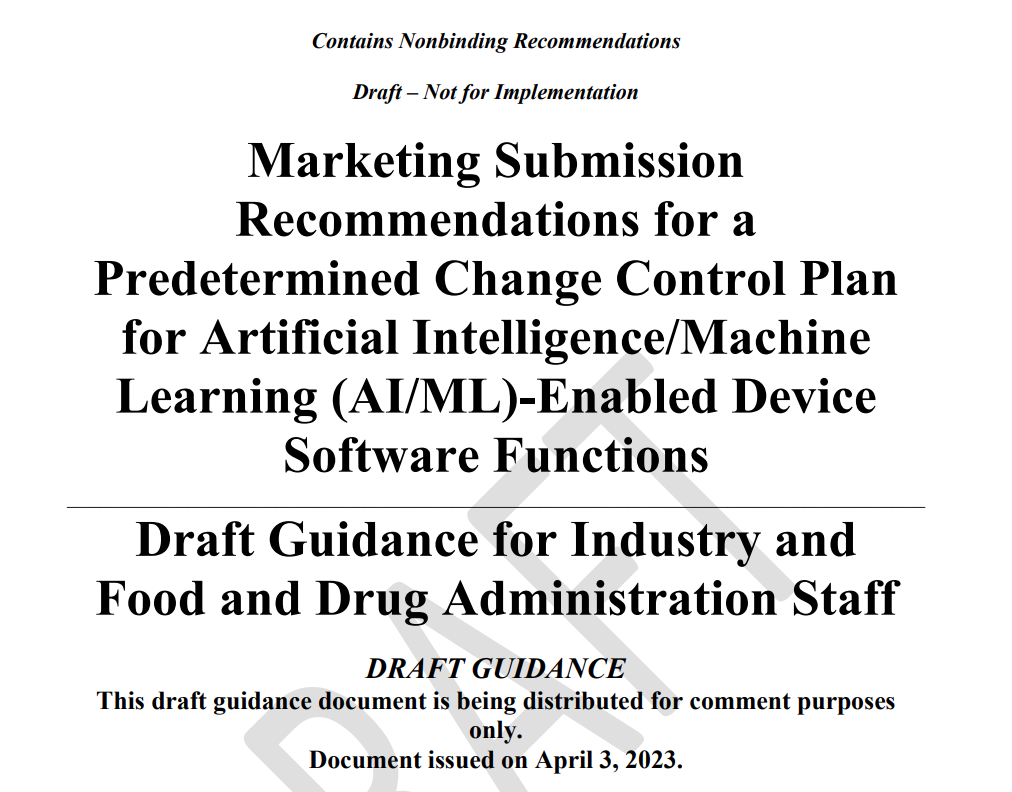
The FDA recently (April, 2023) came out with a draft guidance, Marketing Submission Recommendations for a Predetermined Change Control Plan for Artificial Intelligence/Machine Learning (AI/ML)-Enabled Device Software Functions. The document provides guidance for developing a Predetermined Change Control Plan (PCCP) for managing changes to the device software functions.
The PCCP is a critical component of the regulatory approval process, as it ensures that changes to the AI/ML algorithms or models, that drive the device software functions are properly validated and verified before being implemented.
Background
Artificial Intelligence (AI) and Machine Learning (ML) are transforming the field of medical devices by enabling more precise and efficient diagnoses, treatment plans, and patient outcomes. Managing change control for a technology that is consistently changing is a big challenge.
To address these challenges, in 2019 the FDA published the Proposed Regulatory Framework for Modifications to Artificial Intelligence/Machine Learning (AI/ML)-Based Software as a Medical Device (SaMD) – Discussion Paper and Request for feedback, which hoped to address and begin a conversation on how to market these future AI/ML devices.
The discussion paper described FDA’s foundation for a potential approach to premarket review for AI/ML driven software modifications. The ideas outlined in the 2019 discussion paper leveraged practices from the FDAs current premarket programs and relied on the International Medical Device Regulators Forum’s (IMDRF) risk categorization principles, the FDA’s benefit-risk framework, risk management principles described in the Software Modifications guidance, and the total product lifecycle approach envisioned in the Digital Health Software Precertification (Pre-Cert) Pilot Program.
Key Elements of Draft Guidance
The FDA’s April 2023 guidance provides a comprehensive framework for developing a PCCP, including the following key elements:
- Risk Assessment Process: The PCCP should include a risk assessment process that identifies potential risks associated with changes to the AI/ML algorithms or models, as well as the potential impact on patient safety and device performance. The risk assessment should be based on a thorough understanding of the device’s intended use, user population, and potential failure modes.
- Monitoring Performance: The PCCP should include an approach to monitoring the device’s performance following changes to the AI/ML algorithms or models. This may involve collecting and analyzing data on device performance, as well as implementing feedback mechanisms to identify and address any issues that arise.
- Managing Changes: The PCCP should include a plan for managing changes to the AI/ML algorithms or models. This may involve establishing a change control board, developing a process for documenting and tracking changes, and ensuring that changes are properly validated and verified before being implemented.
- Transparency and Explanation: The FDA emphasizes the importance of transparency and providing clear and concise explanations of the intended use, intended user population, and limitations of the device. Manufacturers should also be transparent about the use of AI/ML in their devices, including providing detailed information on the algorithms and models used, and how they were developed and validated.
- Early Engagement with the FDA: The FDA encourages manufacturers to engage with the agency early in the development process to ensure that their products meet regulatory requirements. This may involve submitting a pre-submission package, engaging in early meetings with the FDA, and seeking input from the agency throughout the development process.
Though still a draft guidance, it provides a detailed framework for ensuring the safety and effectiveness of AI/ML-enabled medical devices, while also promoting innovation in this rapidly evolving field. By developing a robust PCCP that includes risk assessment, performance monitoring, change management, transparency, and early engagement with the FDA, manufacturers can ensure that their products meet regulatory requirements while continuing to deliver effective benefits to their intended users.
Image: FDA.gov
Taimoor Khan is a QA/RA Specialist at StarFish Medical. Based in our Toronto office, Taimoor works on a variety of medical device projects. He follows his own advice on ROHS and REACH management and qualification regularly.






